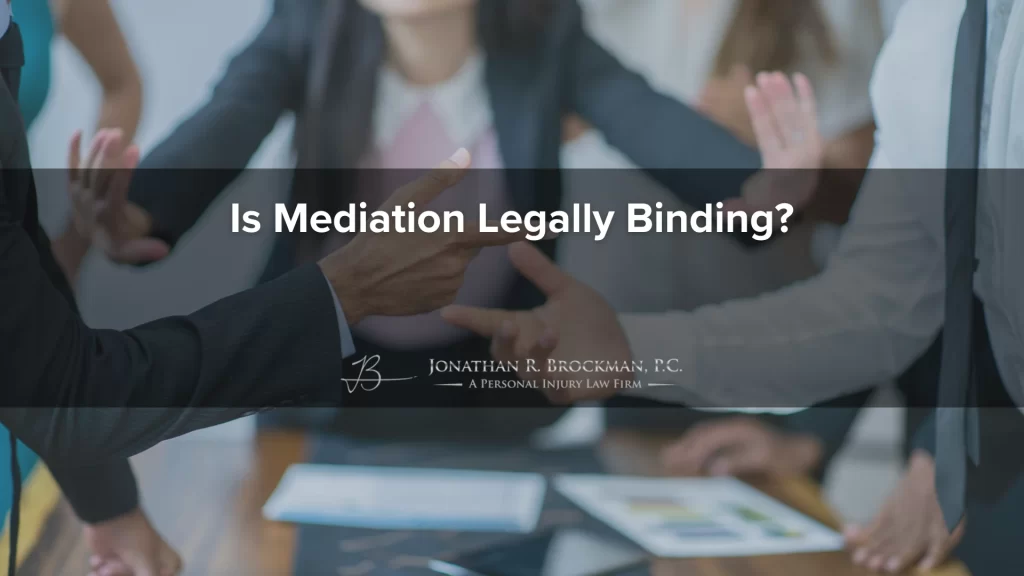Posted on Wednesday, November 1st, 2023 at 9:00 am

If you’re seeking compensation in a Georgia personal injury case and you’re having trouble getting the insurance company to offer an appropriate settlement, mediation might work for you. If an agreement is reached in mediation, the parties sign a settlement agreement, and a judge signs off on it, then yes, mediation is legally binding. However, if there’s no agreement, the mediator’s suggestions are not binding.
At Jonathan R. Brockman, P.C., our Georgia personal injury attorneys will gladly answer your questions about mediation. For example, you may wonder, “Is mediation legally binding in Georgia?” Following is more information about how the mediation process.
How Does Mediation Work?
Mediation and negotiation aren’t the same. The negotiation process typically involves these steps:
- Your lawyer submits a claim with supporting evidence.
- The insurance adjuster reviews the claim.
- The insurance company offers a settlement.
- If the settlement offer is too low, your attorney pushes back.
Mediation differs from traditional negotiations in the following key ways:
- A neutral third party (the mediator) allows both sides to state their cases. The goal of the mediator is to help the parties discuss the matter in a civil way. When both parties can clearly state their positions, reaching agreements may be easier.
- Mediation sessions can take place in a more informal location than a courtroom.
- There is no pressure to arrive at a settlement during mediation. Neither party needs to accept a settlement if they can reach an agreement each side can live with.
Mediation is an approach to consider if the other party is willing to participate in good faith. You could save money and time. Your lawyer can review your case and explain in greater detail whether mediation would be a good option.
Mediation Outcomes
Mediation can result in one of three outcomes. First, if the parties are close to arriving at an agreement, they can schedule another session to finish up.
Next, if there is a meeting of the minds and the parties reach a settlement, the mediator or one of the lawyers can draw up the agreement, the parties can sign it, and a judge can approve it. That’s the end of the case.
If no settlement can be reached, the case can proceed to trial.
How Are Mediation Agreements Enforced?
 The next step in the mediation process involves presenting the signed agreement to a court. The court must sign off on it to make the agreement official. The mediation agreement becomes legally enforceable at that point.
The next step in the mediation process involves presenting the signed agreement to a court. The court must sign off on it to make the agreement official. The mediation agreement becomes legally enforceable at that point.
Be aware that some mediation agreements are not enforceable. A mediation agreement may not be legally enforceable if:
- A party entered into the agreement under duress.
- A term of the agreement conflicts with existing law.
- One party didn’t possess the mental capacity to enter into the agreement.
A legal contract can be enforced by taking the defaulting party to court so the judge can order them to abide by the terms of the contract. In addition, some mediation agreements specify how they may be enforced.
Consequences of Breaking a Mediation Agreement
You may sue the other party for breach of contract if they fail to abide by the terms of a mediation agreement. This also means they can sue you if you violate any of the contract’s terms.
For example, an agreement might include a non-disclosure clause limiting how you may discuss the case going forward. If you fail to keep the details of the episode confidential, the other party has grounds to take you to court and ask for compensation.
The agreement may also include a release of liability clause. Such a clause ensures you can’t file additional claims against the same party or their insurer for the same incident. However, that clause may no longer apply if the other party violates the mediation agreement’s terms.
What If Mediation is Not Successful?
Mediation doesn’t always lead to a resolution. At the beginning of the mediation session, the mediator will have all the parties sign a confidentiality agreement. All discussions you had during mediation will remain confidential. Even if mediation doesn’t result in a positive outcome, you may still continue traditional negotiations. And if you go to court, nothing that was said in confidence in mediation can be used in court.
Contact a Georgia Personal Injury Lawyer Today
At Jonathan R. Brockman, P.C., our Georgia personal injury lawyers are on hand to discuss mediation in greater detail with you. Get started today by contacting us online or calling us at 770-205-8887 to schedule your free case review.
Related Posts
How to File a Personal Injury Claim and Lawsuit
Best Ways to Track Medical Expenses after My Accident
How to Scare an Insurance Adjuster
